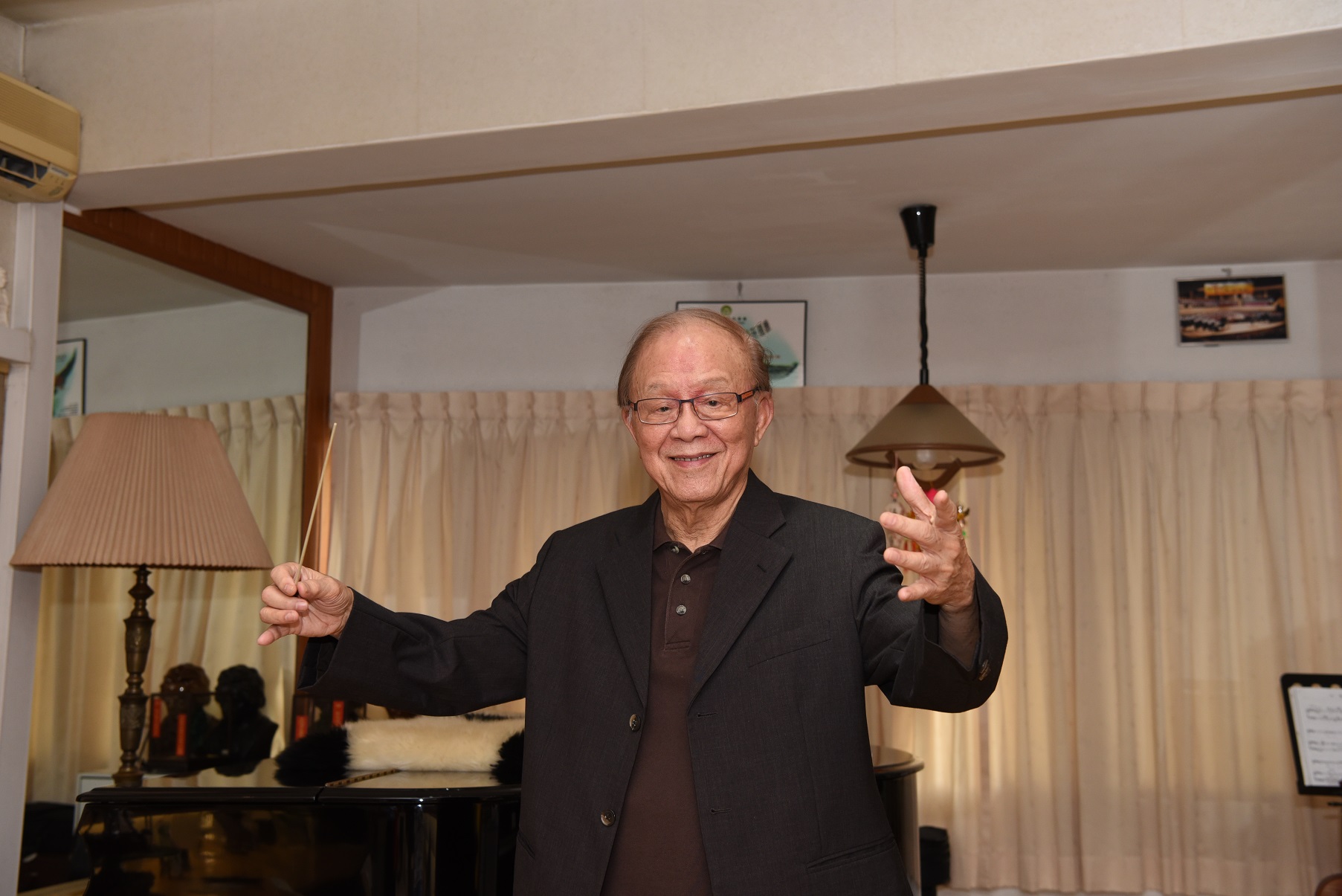(WATCH: Epoch Times Spoke to Mr Lee Yuk Chuan, President of the Singapore Choral Association)
“A good conductor is able to condition the choir members to achieve the right state. Each member is able sing in tune with emotional honesty, while blending into a chorus without overwhelming each other.” – Mr Lee Yuk Chuan, a pioneer of Singapore’s music scene
By Epoch Newsroom
At the age of 83, Mr Lee Yuk Chuan still leads an active and fulfilling life. A cancer survivor, he continues to conduct choral performances at the Esplanade, and he still teaches violin classes. But Mr Lee’s story is more than the average active senior’s story.Mr Lee is a pioneer of Singapore’s music scene, and he has devoted himself to developing local music for the past half a century. For his significant contributions and impact, Mr Lee was awarded the Meritorious Award by COMPASS in 2000, and the Public Service Medal in 2001. Currently, he is the President of the Singapore Choral Association and the Honorary Chairman of the Association of Composers.
In an interview with Epoch Times, Mr Lee shares his journey as a conductor, composer and musician, and the fascinating insights he has drawn from his musical journey.

Late Bloomer
Born in 1933 in Hong Kong, Mr Lee moved to Singapore with his family when he was 6 years old. Mr Lee’s father, a renowned Cantonese opera singer in Hong Kong, had been engaged to perform in Singapore.
Growing up in an opera troupe, Lee was constantly exposed to singing and rehearsals, which helped develop his sense of music and rhythm.
But Mr Lee did not venture into Chinese opera singing or any other form of music until his teenage years, when he attended a musical audition by pure serendipity. Because of his perfect pitch, he was recruited into the Rediffusion choir. He was later chosen as the music conductor for his alumni choir and Chinese orchestra.
With his new responsibility as a conductor, Lee decided that he urgently needed to upgrade his musical skills. This was when he began taking up classes in the violin, singing, and conducting.
Mr Lee initially supported his music activities with a day-time job in a bank. But due to his prominence in the local music circle, he was later hired to be the music director of the Singapore Armed Forces Music and Drama Company. Not long after, he resigned to become a full-time violin teacher.
Bowing His Way Through
“The violin is the most difficult musical instruments to play,” says Mr Lee. But, at the same time, “the violin is the most expressive instrument, as it is closest to the human voice in terms of range and tone.”
The violin is capable of producing melodies that range from soothing to sonorous, filling each transition with rhythm and emotion. A solo violin piece is expressive enough to hold its own, and can stir the hearts of even those without musical background.
To illustrate the challenge of mastering the violin, Mr Lee explains that the highest note a soprano can reach is the high E (E5). By contrast, the highest note a violin can reach is a few octaves higher, depending on the skill of the violinist.
This skill depends on the violinist’s aural ability (good ear for pitch) and kinesthetic ability (finger and hand dexterity). A violinist must be able distinguish whether a note is in or out of tune, and then correct the pitch rapidly and automatically as the notes are played. Mentally singing the note helps fingers to land in the right spot.
But Mr Lee says that mastering violin techniques is only one aspect. A superior violinist has the ability to convert the musical notes into something vastly spiritual and meaningful, touching the hearts of the audience.
Strong listening skills, dexterity, and expressiveness are inborn qualities of a strong musician. Without these innate abilities, Mr Lee feels it is difficult for one to become a professional musician.
While not everyone can become a professional musician, but Mr Lee has observed that people who have learnt music tend to be more elegant and noble, even if their skills have not reached professional standards.
As such, when Mr Lee comes across talented and interested students, he goes out of his way to teach them. When necessary, he travels to the students’ homes to teach them, and even allows students to owe him tuition fees if their families are less well-off.
Having over 40 years of violin teaching experience, Mr Lee points out that a child’s first violin teacher is very important, as he or she will be the first one to teach the correct posture for playing the violin. This posture is very important, as the wrong posture may affect the student’s future performance.
Till today, Lee is still teaching the violin. Over the past four to five decades, he has taught over a hundred students, many of whom have come together to form the Lee Yuk Chuan String Orchestra.
What Lies Beyond the Conductor’s Back?
“Many arduous hours of memorising scores, practice and rehearsals, as well as musicality, charisma and rich life experience.” – Mr Lee Yuk Chuan, a pioneer of Singapore’s music scene
During a performance, the most we see of the conductor is his back. But what lies beyond the back of the conductor?
“Many arduous hours of memorising scores, practice and rehearsals, as well as musicality, charisma and rich life experience.” According to Mr Lee, these are the features of a good conductor.
Mr Lee stresses that not every musician has the opportunity to become a conductor. “The musician needs opportunities to exhibit his talents and artistic leadership, before he can be recognised and invited to conduct for a professional choir,” he says.
Recalling his early conducting experiences, Mr Lee remembers how his legs shook and how the baton felt like it was slipping from his fingers. Then there was the fear of making mistakes, as a conductor cannot afford to make a single error. Every second onstage felt like a century.
After many decades of conducting numerous choral performances, some of which involved choirs with thousands of members, Mr Lee says with a smile, “Nowadays, conducting has become very much enjoyable.”
Mr Lee emphasises that the conductor’s hand gestures must be formally trained. The right hand maintains the tempo, while the left hand shapes the music.
While students can improve with formal training on music conducting, a conductor’s gift still depends significantly on the self. Mr Lee says, “A good conductor is able to condition the choir members to achieve the right state. Each member is able sing in tune with emotional honesty, while blending into a chorus without overwhelming each other.”
Lee’s ‘Babies’
Not long after he became a conductor, Lee started composing Chinese songs as the choir needed local Chinese songs to sing.
For Mr Lee, composing music has been his most fulfilling work to date, and he fondly calls his compositions his “babies”.
Mr Lee’s composition themes range from personal romances to parental grief, friendship, the brutality of the war, amongst others. His favourite pieces revolve around society, the human spirit, and universal values such as the hope for world peace.
One particular piece was inspired by a vacation experience in Kuantan, Malaysia. After sheltering from a heavy rainstorm, Mr Lee saw a rainbow in the sky. It was the most beautiful rainbow he had ever seen, yet it lasted for just a moment. This inspired him to write a song exhorting listeners to make meaningful contributions to society in their very short lifespan. Like a rainbow, “In contrast to the age of the universe, the lifespan of a human being is very short,” says Mr Lee.
Mr Lee adds that he is always on the lookout for elegant phrases and lyrics that resonate with him. From there, his inspiration for the accompanying melody would come.
Sometimes deadlines were tight, and Mr Lee recounts stressful times when he had to write pieces for upcoming concerts within a short time. But whenever he heard his music being recreated so beautifully by the choir, regardless of whether the piece had been forced or inspired, Mr Lee says the sense of fulfillment was always beyond words.
Mr Lee highlights that classical song-writing involves composing melodies for poems or lyrics. This contrasts with pop songs today, whereby the tune is composed before the lyrics.
Living Example of Music’s Health Benefits
According to Mr Lee, learning music can have a positive impact on one’s health. He explains, “When singing, one has to take deep breaths and expand one’s lung capacity; this can be beneficial to one’s health.”
“When we play musical instruments, our fingers keep moving. This helps to improve blood circulation. It’s the same with conducting; our hands are constantly moving and this helps with blood circulation.”
Mr Lee himself is a living testimony to music’s health benefits. In 2005, just three months after an operation, he travelled to Tibet for a choir performance involving a thousand singers.
During our two-hour interview, despite his 83 years of age, Mr Lee was still very sharp and articulate. “Learning music can increase one’s longevity,” he says.
Throughout his life, Mr Lee has been an active proponent of singing, founding several choirs including the Melo Art Choir, which is still active today.
Currently, most of Singapore’s Chinese language choral groups consist of retirees and a few middle-aged members. Mr Lee hopes that the younger generation can participate as well.
“The middle-aged voice sounds the best yet that is exactly what we are lacking right now,” he commented in an interview with the National Library Board.
















